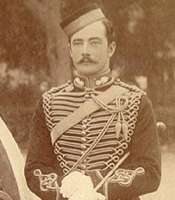Webb Gillman
| Sir Webb Gillman | |
|---|---|
 Lieutenant Webb Gillman c.1896 | |
| Born |
26 October 1870 Coachford, Ireland |
| Died |
20 April 1933 (aged 62) London, England |
| Allegiance |
|
| Service/branch |
|
| Years of service | 1889–1933 |
| Rank | General |
| Commands held |
Eastern Command Royal Military Academy, Woolwich 17th Indian Division |
| Battles/wars | |
| Awards |
Knight Commander of the Order of the Bath Knight Commander of the Order of St Michael and St George Distinguished Service Order Mentioned in Despatches (11) |
General Sir Webb Gillman, KCB, KCMG, DSO (26 October 1870 – 20 April 1933) was a British Army general during the First World War.
Military career
Educated at Dulwich College, Gillman was commissioned into the Royal Field Artillery in July 1889.[1] He was promoted to lieutenant on 27 July 1892, and to captain (supernumerary to the establishment) on 9 October 1899. He served in the Second Boer War 1899-1900, where he took part in the Relief of Kimberley, and the following battles of Paardeberg (late February 1900), Poplar Grove, and Driefontein (March 1900).[2] In May 1902 he received a regular appointment as captain of the 119 Battery of the Field Artillery.[3] He later spent time in Southern Nigeria in 1902.[1]
He served in the First World War as a General Staff Officer in 13th Division and then as a brigadier with the Mediterranean Expeditionary Force sent to Gallipoli in 1915.[1] He was then a major general with the British Salonika Force from 1916 to 1917 before becoming commander of 17th Indian Division in August 1917.[1] He became Chief of General Staff for the Mesopotamian Expeditionary Force later on in 1917.[1]
After the war he became Commandant of the Royal Military Academy, Woolwich in 1920, Inspector of Artillery at the War Office in 1924 and Master-General of the Ordnance in 1927.[1] In 1927 he spent three months in Singapore assessing the defence capability of the Naval Base there.[4] Finally he was appointed General Officer Commanding-in-Chief for Eastern Command in 1931; he died in office in 1933.[1]
References
- 1 2 3 4 5 6 7 Liddell Hart Centre for Military Archives
- ↑ Hart´s Army list, 1903
- ↑ The London Gazette: no. 27444. p. 4051. 20 June 1902.
- ↑ Gillman Village
| Military offices | ||
|---|---|---|
| Preceded by Geoffrey White |
Commandant of the Royal Military Academy Woolwich 1920–1924 |
Succeeded by Ronald Charles |
| Preceded by Sir Noel Birch |
Master-General of the Ordnance 1927–1931 |
Succeeded by Sir Ronald Charles |
| Preceded by Sir Robert Whigham |
GOC-in-C Eastern Command 1931–1933 |
Succeeded by Sir Cyril Deverell |